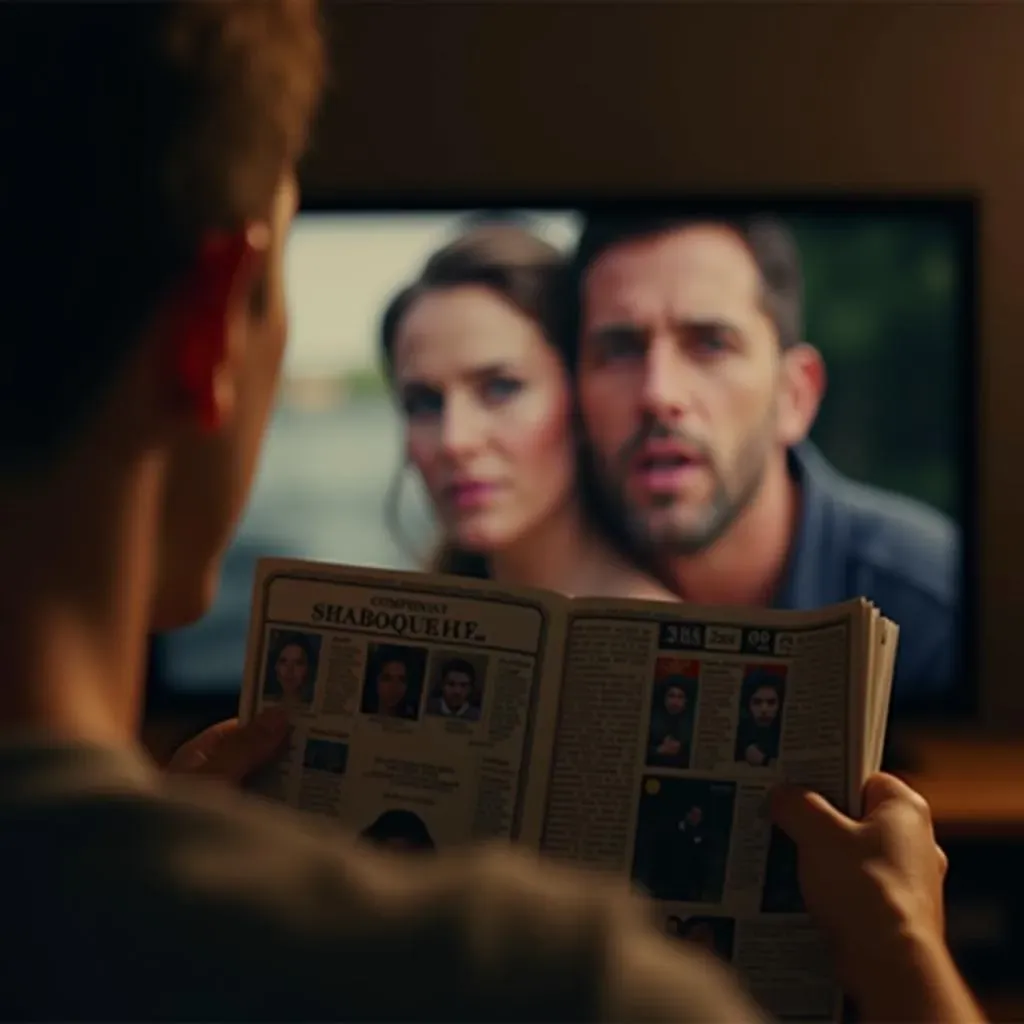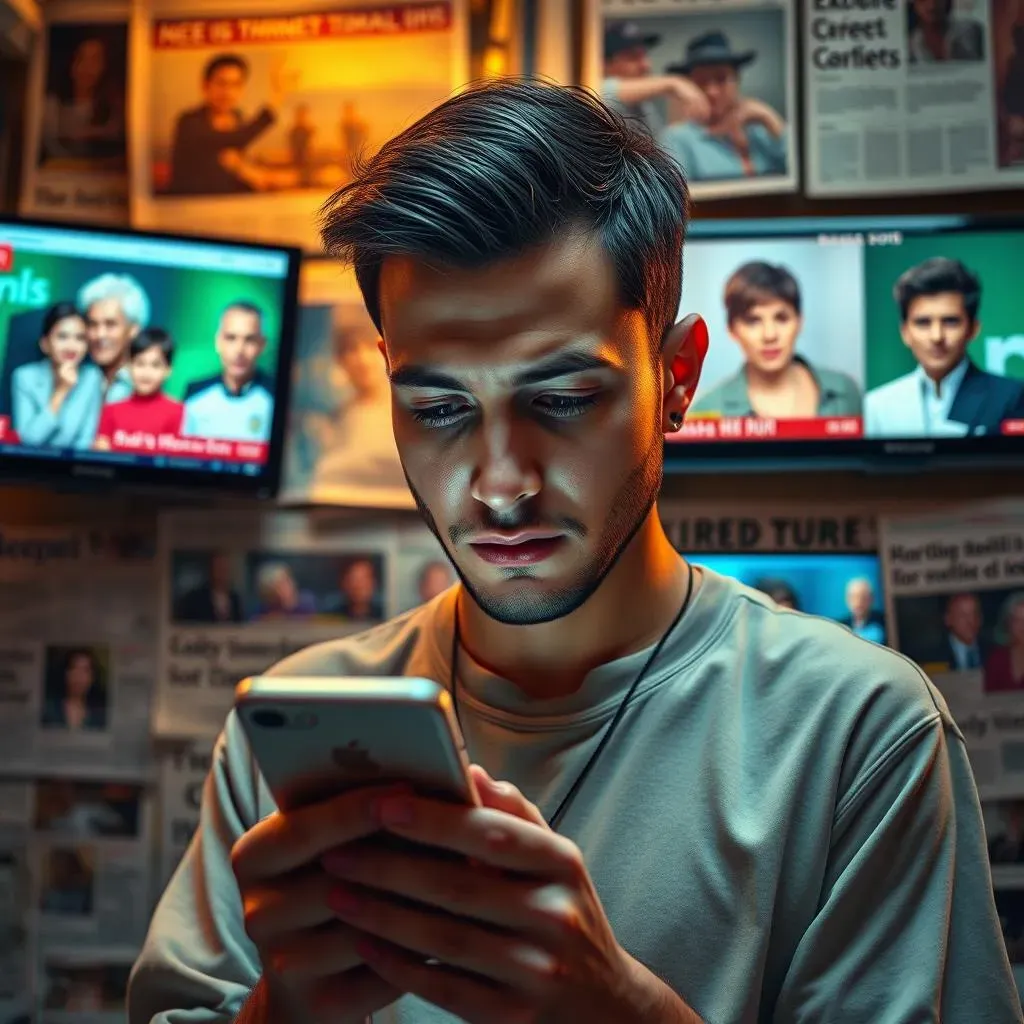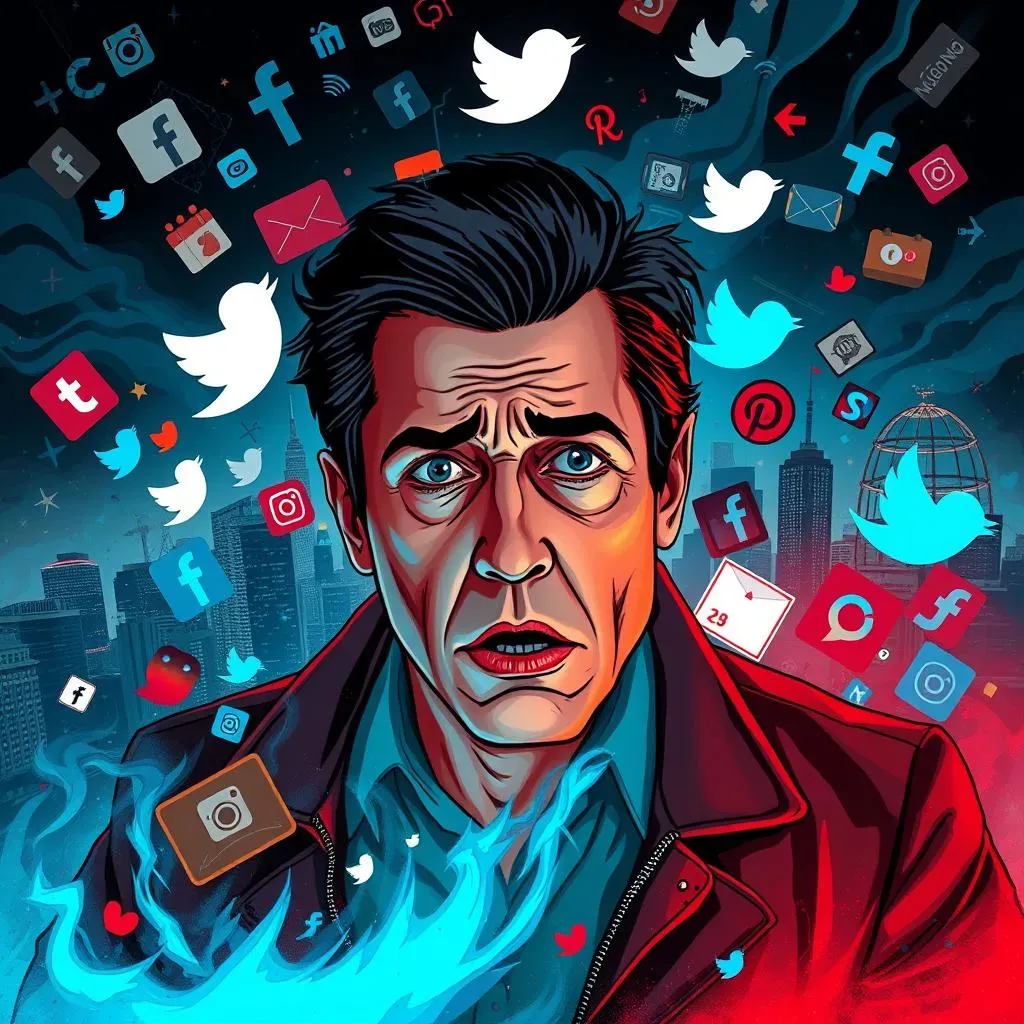Table of Contents
Ever wondered why we're so captivated by trending celebrity controversies? From scandalous affairs to explosive legal battles, the lives of famous figures often dominate headlines. This article explores the fascinating world of trending celebrity controversies in 2024, examining not just the juicy details but also the deeper implications. We'll unpack why these stories resonate so deeply with us, analyzing how social media amplifies the drama and shapes public opinion. We'll also delve into the ethical considerations surrounding the reporting of these controversies, exploring the fine line between public interest and invasion of privacy. Get ready to uncover the hidden forces behind trending celebrity controversies and understand their impact on our culture. Prepare to be informed, entertained, and maybe even a little shocked as we navigate the complex landscape of fame, scandal, and the ever-evolving digital age. This exploration will help you understand not only the "what" but also the "why" behind these captivating stories, leaving you with a more nuanced understanding of trending celebrity controversies and their lasting effects.
Understanding Trending Celebrity Controversies: Why We Care

Understanding Trending Celebrity Controversies: Why We Care
The Allure of the Scandal
So, you're diving into the world of celebrity controversies? Welcome! It's a fascinating, sometimes messy, and always captivating field. We're drawn to these stories for a multitude of reasons, often intertwined and complex. Think of it like this: celebrities are, in a way, modern-day mythology. They represent aspirational lifestyles, immense wealth, and often, a carefully curated public image. When that image cracks, we're naturally curious. It's a peek behind the curtain, a glimpse into the imperfections of those we often put on pedestals. The drama inherent in these scandals taps into our innate human fascination with conflict, betrayal, and redemption. We want to know what happened, why it happened, and what happens next. It's a primal urge, the same one that drives us to watch a captivating thriller or read a gripping mystery novel. It's a complex blend of voyeurism, empathy, and a desire to understand human nature in its most dramatic form. And let's be honest, sometimes it's just plain fun to gossip.
But it's more than just idle curiosity. Celebrity controversies can act as a reflection of broader societal issues. They can spark important conversations about power dynamics, morality, and the ethics of public figures. Think about the recent conversations surrounding online harassment, consent, and the impact of social media on mental health. Many of these discussions have been fueled, in part, by celebrity controversies, bringing these issues into the mainstream and prompting public debate. These moments can force us to examine our own values and beliefs, challenging our assumptions about fame, responsibility, and the price of celebrity. It's a complex dance between the personal lives of individuals and the collective consciousness of society. And the more we understand the "why" behind our fascination, the more we can engage with these stories critically and thoughtfully.
Reason for Fascination | Explanation |
|---|---|
Human Interest | Stories of conflict, betrayal, and redemption are inherently compelling. |
Social Commentary | Controversies often reflect broader societal issues and spark important conversations. |
Escapism | They offer a distraction from our own lives and a sense of shared experience. |
Analyzing the Impact of Trending Celebrity Controversies on Society

Analyzing the Impact of Trending Celebrity Controversies on Society
Ripple Effects: Beyond the Headlines
Celebrity controversies rarely stay confined to gossip columns. They often have far-reaching consequences, influencing everything from public discourse to consumer behavior. Think about the impact of a high-profile athlete facing accusations of domestic violence. The ensuing media storm can damage their brand image, leading to lost sponsorships and a decline in public support. This, in turn, affects the businesses associated with them, potentially causing financial losses and reputational damage. The ripple effect extends beyond the individual, impacting the industries they represent, and even influencing broader conversations about gender equality and violence prevention. The public outcry and subsequent debate can lead to policy changes, increased awareness, and even a shift in societal attitudes. It’s a complex web of interconnected consequences, highlighting the profound influence celebrities wield.
Moreover, these controversies can significantly impact the mental health of both the celebrities involved and the public who follow their stories. The relentless media scrutiny, online harassment, and public judgment can take a significant toll on the well-being of individuals in the spotlight. This, in turn, can fuel further controversy, creating a vicious cycle of negative attention and emotional distress. For the public, the constant stream of negative news can contribute to feelings of anxiety, cynicism, and a distorted view of reality. The idealized images presented by the media often clash with the messy realities of human behavior, creating a disconnect that can be emotionally taxing.
Impact Area | Specific Example | Consequences |
|---|---|---|
Business | Loss of sponsorships due to athlete's misconduct | Financial losses for brands and athletes |
Social Discourse | Debate surrounding online harassment of a celebrity | Increased awareness and potential policy changes |
Mental Health | Media scrutiny leading to celebrity's depression | Negative impacts on both celebrity and public well-being |
Cultural Shifts and Moral Debates
Beyond the immediate consequences, trending celebrity controversies can spark important cultural shifts and fuel ongoing moral debates. These events often serve as a barometer of societal values, reflecting our evolving understanding of ethics, morality, and acceptable behavior. For instance, a celebrity's public apology for past actions can initiate a conversation about accountability and forgiveness, prompting a re-evaluation of societal expectations and standards. These moments can also challenge existing power structures, bringing to light issues of inequality, discrimination, and injustice. The ensuing discussions can push for meaningful reforms and inspire positive change, even though the initial event might have been deeply negative. It's a reminder that even from chaos and scandal, progress can emerge.
Furthermore, celebrity controversies often force us to confront uncomfortable truths about ourselves and our society. They expose hypocrisy, challenge our biases, and prompt us to examine our own complicity in perpetuating harmful systems or behaviors. By analyzing the responses to these controversies – both positive and negative – we can gain valuable insights into the dynamics of power, influence, and public opinion. It’s an opportunity to learn from the mistakes of others, to challenge our own assumptions, and to work towards a more just and equitable society. The narratives surrounding these events are often complex and multifaceted, demanding careful consideration and critical engagement. Understanding these complexities is crucial to harnessing the potential for positive change.
- Increased awareness of social issues
- Challenges to existing power structures
- Opportunities for societal learning and growth
- Prompts re-evaluation of societal values and norms
The Role of Social Media in Amplifying Trending Celebrity Controversies

The Role of Social Media in Amplifying Trending Celebrity Controversies
The Social Media Firehose
Let's be honest, social media is the ultimate amplifier for celebrity controversies. It's a 24/7 news cycle on steroids, fueled by instant updates, viral trends, and the insatiable appetite for drama. A single tweet, a leaked photo, or a controversial Instagram post can ignite a wildfire of speculation, turning a minor incident into a full-blown media frenzy. The immediacy and reach of social platforms allow information—and misinformation—to spread at an unprecedented rate, often bypassing traditional media gatekeepers. This creates an environment where rumors, opinions, and judgments are shared and amplified without much fact-checking, leading to a distorted and often exaggerated narrative. The algorithms that govern these platforms further contribute to this echo chamber effect, prioritizing content that generates engagement, regardless of its accuracy or ethical implications. Essentially, social media has become the primary battleground for public opinion, shaping the narrative and influencing the trajectory of celebrity controversies.
Consider the power of hashtags. A single, well-chosen hashtag can unite a massive online community, turning a trending topic into a collective conversation. This organized online discourse can have a significant impact on public opinion, influencing everything from brand endorsements to legal outcomes. Furthermore, the anonymity afforded by social media platforms often emboldens users to express opinions they might not otherwise share publicly. This can lead to online harassment, cyberbullying, and the spread of harmful misinformation, further intensifying the emotional toll on celebrities and potentially exacerbating the situation. The impact of this amplified narrative can have lasting consequences for all involved, making the role of social media in these controversies both significant and complex.
Social Media Platform | Amplifying Mechanism | Impact |
|---|---|---|
Real-time updates, trending hashtags | Rapid spread of information (and misinformation) | |
Visual content, influencer engagement | Emotional impact, visual storytelling | |
TikTok | Short-form videos, viral challenges | Memeification of events, rapid dissemination |
Navigating the Ethics of Reporting on Trending Celebrity Controversies

Navigating the Ethics of Reporting on Trending Celebrity Controversies
Balancing Public Interest and Privacy
Reporting on trending celebrity controversies presents a constant ethical tightrope walk. The public has a right to know about the actions of public figures, especially when those actions have broader societal implications. However, this right must be carefully balanced against the fundamental right to privacy. The line between legitimate public interest and salacious gossip is often blurry, and journalists must exercise considerable judgment in determining what information is truly newsworthy and what constitutes an unwarranted invasion of privacy. It's not just about what's legal; it's about what's ethical. A responsible approach requires thorough fact-checking, verifying sources, and considering the potential impact on all parties involved. Sensationalizing or twisting facts for greater engagement is unethical and can have devastating consequences for individuals and their families.
Consider the case of a celebrity struggling with addiction. While the public might be curious about their personal struggles, publishing details without their consent could be deeply damaging. It's essential to approach such stories with sensitivity, respect, and a recognition of the human cost involved. It's a fine line, but it's one that journalists must carefully negotiate to ensure ethical reporting. The goal should be to inform and engage, not to exploit or harm.
Ethical Consideration | Best Practice |
|---|---|
Privacy vs. Public Interest | Prioritize verified information relevant to broader societal issues. |
Accuracy and Fact-Checking | Thoroughly verify sources and avoid sensationalism. |
Impact on Individuals | Consider the potential harm to those involved and their families. |
Avoiding Sensationalism and Misinformation
The fast-paced nature of online news often encourages sensationalism and the spread of misinformation. Clickbait headlines, biased reporting, and the amplification of rumors on social media create a toxic environment where truth is often the first casualty. It's crucial for journalists to resist the temptation to exploit the drama for increased readership or engagement. Instead, they must prioritize accuracy, objectivity, and a commitment to factual reporting. This includes carefully verifying information from multiple sources, avoiding speculative language, and providing context to the events being reported. Transparency about sources and potential biases is also essential to maintain credibility and trust with the audience. In the age of social media, where misinformation can spread like wildfire, ethical journalism is more crucial than ever before.
Responsible reporting requires a commitment to nuance and a willingness to challenge one's own biases. It’s essential to avoid simplistic narratives or generalizations that reduce complex situations to easily digestible soundbites. This means presenting multiple perspectives, acknowledging uncertainties, and avoiding language that fuels prejudice or hatred. The goal is not to simply report the facts but to help the audience understand the complexities of the situation and form their own informed opinions. It's a commitment to responsible storytelling that prioritizes truth, accuracy, and a deep respect for the individuals involved.
- Prioritize accuracy and avoid sensationalism.
- Verify information from multiple reliable sources.
- Provide context and avoid generalizations.
- Be transparent about sources and potential biases.
The Responsibility of the Consumer
While the ethical responsibility largely rests on journalists and media outlets, consumers also play a vital role in shaping the landscape of celebrity controversies. It's crucial for individuals to be critical consumers of information, questioning sources, identifying biases, and verifying facts before sharing or engaging with content online. The spread of misinformation is often fueled by uncritical acceptance of information and a lack of media literacy. By developing critical thinking skills and a healthy skepticism towards sensationalized narratives, individuals can help curb the spread of harmful rumors and contribute to a more informed and responsible public discourse. This includes being mindful of the language used in online discussions and challenging harmful stereotypes or prejudices.
Furthermore, consumers have a responsibility to engage in respectful and constructive dialogue, avoiding online harassment, cyberbullying, or the spread of hateful rhetoric. The emotional toll on celebrities involved in controversies is often amplified by the negativity and vitriol found online. By choosing to engage in thoughtful and empathetic discussions, individuals can contribute to a healthier online environment and promote a more responsible approach to consuming and sharing information about celebrity controversies. It's a shared responsibility to foster a media landscape that prioritizes truth, accuracy, and respect for all involved.